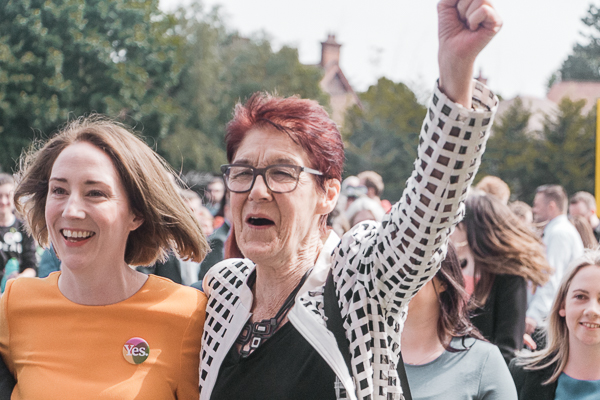We’ve had some shock results in the last few years. Most people are now familiar with that feeling of waking up and not quite believing what’s happened around the world, whether it was Donald Trump’s election or the Brexit referendum. Hearing the exit polls last night for the first time was a similar experience, but incredibly, this time, the overriding feeling was of joy, not fear.
The result of the marriage equality referendum in 2015 was met with great relief and celebration, but the level of disbelief we’re seeing around the country today is unprecedented. People were all set for a nail-biting count, with the referendum hopefully passing by the skin of its teeth. And that would’ve been good enough. But I don’t think anybody anticipated what is clearly a landslide victory for the yes side.
This really is a victory on multiple fronts. First and foremost, it is a long overdue win for women’s basic rights and healthcare. The direct, practical impact of this result on so many people’s everyday lives can’t be understated. Women around Ireland can collectively heave a sigh of relief, knowing that they will be more safe, valued and trusted in their own country.
But today’s result is also hugely symbolic. It marks another landmark date in Ireland’s ongoing social revolution, and unshackles the country further from the conservatism and religiosity that have long impeded change.
Today marks another landmark date in Ireland’s ongoing social revolution
It was said many times during and after the marriage equality referendum three years ago that a new generation of activists and politically engaged young people had been ignited. A lot of those who had previously been disenfranchised suddenly felt empowered, once they had concrete evidence that they could effect real change.
Today, we’re seeing that shift in action. After the tragedy that was Savita Halappanavar’s death in 2012, the wheels of a movement were set in motion. It started with quiet marches and vigils. We’ve all heard people say that protests don’t work, but this campaign strongly suggests otherwise. The national March for Choice grew year on year, culminating in rallies of gargantuan proportions. It wasn’t just down to street activism, of course. It was the often arduous efforts and relentless lobbying of grassroots groups around the country, much of them led by students and young people, that ultimately made this happen.
The knock-on effects of this campaign and its success won’t end here. In recent months, conversations have opened up around so many stigmatised issues, from abortion and mental health to feminism. New voices have come out of the woodwork telling personal stories and sharing unexpected perspectives. As with all open secrets, we all knew that somebody close to us had probably been affected by the eighth. But it was a lot easier to push the reality aside when it was so hidden from view, and nobody dared to openly broach the issue.

Now, the floodgates have been blown wide open. It’s ironic that, in a country with such a long history of hushing up its problems, we suddenly can’t stop talking. From the streets to social media, Ireland has been thronged with a deafening support for repeal and all that it entails.
It may have started with women, particularly young women. But what’s truly heartening is how far beyond that the movement has extended. There’s not a demographic in Ireland that didn’t come out to voice their support for this change. It’s certainly united young people, who voted emphatically for yes. It’s also engaged many men with a cause that was once almost solely the remit of women.
It’s sometimes easy to feel despairing about the future, and overwhelmed by the gravity of problems facing any given society. But today’s outcome proves that change is absolutely possible. It can even surprise you. Ireland has a come a long way in a short time, and can now be proudly held up globally as a shining example of progressive, people-led change. In the last few years, activists in this country have gone from strength to strength, from marriage equality through to the water protests to repeal. And today, it’s indisputable that they have achieved results.
When we look ahead, our view is no doubt still blinkered by Friday’s referendum and the priority it’s been given in recent months. There is of course a lot still left to do. But it’s immensely promising that we’ve made it this far from sheer will.
The stereotype of old Ireland is one riddled with shame, abuse and misogyny. Irish people have deserved better for a long time. It’s incredible to watch today as a new wave of activists surpass expectations to make that much-needed progress, and set an example for the rest of the world to boot. If this energy can be kept alive, there’s no end to how far Ireland can go. We’re just a small country and the determination is clearly there. There’s no reason we can’t become one of the most progressive and just societies in the world.







